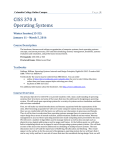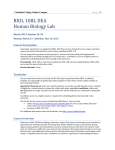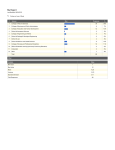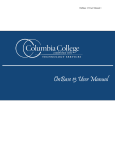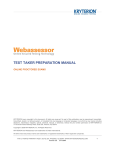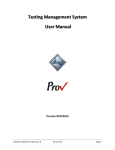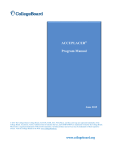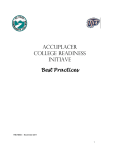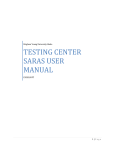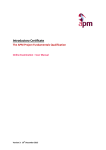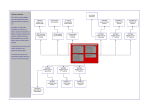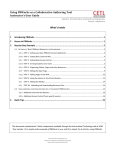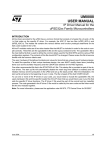Download CISS 370 A Operating Systems
Transcript
Columbia College Online Campus Page |1 CISS 370 A Operating Systems Early Fall Session (15-51) Monday, August 17, 2015 - Saturday, October 10, 2015 Course Description The hardware, firmware and software organization of computer systems, basic operating systems concepts, concurrent processes, CPU and disk scheduling, memory management, deadlocks, systems evaluation and simulation, and performance measurement. Prerequisite: CISS 350 or 358 Proctored Exams: Midterm and Final Textbooks Stallings, William. Operating Systems: Internals and Design Principles, Eighth Ed. 2015. Prentice Hall. ISBN: 978-0-13-380591-8 Textbooks for the course may be ordered from MBS Direct. You can order online at http://direct.mbsbooks.com/columbia.htm (be sure to select Online Education rather than your home campus before selecting your class) by phone at 800-325-3252 For additional information about the bookstore, visit http://www.mbsbooks.com. Course Overview Our primary objective for CISS 370 is to provide students with a basic understanding of operating systems, their structures and some of the issues that must be addressed in designing an operating system. We will touch upon operating systems for a variety of systems such as standalone, multiuser and real-time embedded. First, we will make our initial introductions and become acquainted with the expectations of the class. After becoming acquainted we will cover some computer system basics and operating systems. Once we are comfortable with the basics we will move our discussions to processes and threads. Then it will be time to understand how operating systems manage them via concurrency and its major design focus areas of mutual exclusion, synchronization, deadlock and starvation. Memory management is an area where operating systems have made computing more powerful for the user. We will cover a number of algorithms used to manage memory as well as key concepts such as physical versus logical addressing as well as pages and frames. At the halfway point, we will take a look at scheduling which can be argued is one of the operating systems primary duties. We will look at some of the issues that must be addressed in scheduling on multiprocessor systems. The next discussions turn to I/O and the importance of buffering, file allocation and blocking. This would appear on the surface to be the easy part of designing an operating system but we will learn that it can be very tricky and has its own set of issues that must be considered during design. Next, we will Columbia College Online Campus Page |2 look at security issues, which impact everything we do with computers and the operating system is no exception. We will cover means to authenticate users and the ever-present dangers of viruses. We will wrap up our course with a few key concepts that we see with operating systems today. Distributed processing is an approach to reduce burdens on clients but introduces issues on availability and latencies. Our discussions will cover the pros and cons of fat and thin clients. Technology Requirements Participation in this course will require the basic technology for all online classes at Columbia College: A computer with reliable Internet access, a web browser, Acrobat Reader, Microsoft Office or another word processor such as Open Office. You can find more details about standard technical requirements for our courses on our site. Describe any additional technology requirements unique to this class. Course Objectives To examine the issues involved in operating system design and operation. To understand concurrency control issues. To examine file and memory management techniques. To understand scheduling issues and approaches including processor scheduling and disk scheduling. To understand embedded operating systems and their uses. To investigate virtual environments and distributed processing. To investigate operating system security issues. Measurable Learning Outcomes Grading Explain the major functions of an operating system. Explain threads. Explain concurrency control including deadlock and starvation and techniques for managing concurrency. Evaluate memory management issues including virtual memory, paging, and segmentation techniques. Contrast the most common processor scheduling techniques including the advantages and disadvantages of each. Explain disk scheduling issues and techniques. Evaluate file management systems. Evaluate distributed processing including client/server models and cluster models. Examine operating system security issues. Columbia College Online Campus Grading Scale Page |3 Grade Weights GRADE POINTS PERCENT ASSIGNMENT POINTS A 900-1000 90-100 *** Discussions 240 24% B 800-899 80-89 Info Post Discussions 60 6% C 700-799 70-79 Chapter Questions 180 18% D 600-699 60-69 Papers 120 12% F 0-599 0-59 Quizzes 100 10% Exams 300 TOTAL 1000 PERCENT 30% 100% *** The 15 points for Discussions are awarded on the following basis (explained in Grading Criteria at end of syllabus): 7 Points for the Direct Response to the Question. 8 Points for postings in response to other students’ or my posts (4 points each for 2 posts). (Note the posts to other students or my posts must be within the same week of the Questions as no points will be awarded for posts that are posted after midnight Sunday of the current week) Schedule of Due Dates WEEK 1 2 3 4 5 ASSIGNMENT POINTS DUE DATE Discussion 1 15 Wednesday Discussion 2 15 Friday Info Post Discussion 10 Sunday Chapter Question 1 30 Sunday Discussion 3 15 Wednesday Discussion 4 15 Friday Quiz 1 50 Saturday (due 11:59 pm) Info Post Discussion 10 Sunday Chapter Question 2 30 Sunday Discussion 5 15 Wednesday Discussion 6 15 Friday Info Post Discussion 10 Sunday Chapter Question 3 30 Sunday Discussion 7 15 Wednesday Discussion 8 15 Friday Midterm Exam 150 Monday – Sunday 11:59 pm Paper 1 60 Sunday Discussion 9 15 Wednesday Discussion 10 15 Friday Info Post Discussion 10 Sunday Chapter Question 4 30 Sunday Columbia College Online Campus Discussion 11 15 Wednesday Discussion 12 15 Friday Quiz 2 50 Saturday (due 11:59 pm) Info Post Discussion 10 Sunday Chapter Question 5 30 Sunday Discussion 13 15 Wednesday Discussion 14 15 Friday Info Post Discussion 10 Sunday Chapter Question 6 30 Sunday Discussion 15 15 Wednesday Discussion 16 15 Friday Paper 2 60 Friday Final Exam 150 11:59 CT Saturday TOTAL 1000 6 7 Page |4 8 Assignment Overview Readings and Activities: We will cover 15 chapters in the required text for this course for an average of 2 chapters per week. During our discussions I may recommend online articles of interest that will not be mandatory but will help deepen your understanding of the topics we are discussing. Should you come across an article in your research that you find informative, please share a link to it in a post along with a short summary of the article. Discussion: Each week, I will post 2 discussion topics. I will be looking for responses to these topics that are college level efforts. This means each response should be informative and well written and not a quick one or two sentence response that shares minimal information. I expect that direct responses to the discussion questions be at least 250 words to demonstrate your detailed understanding of the topics. In some cases this may require additional reading or enhancing the response through sharing experiences that you may have as it relates to the subject matter. In addition to the direct responses to the two questions each week, I am looking for a total of 2 posts in each topic against your classmates’ (or my) responses. These responses should advance the discussions and provide more than a “Good post, I agree with you.” I will be looking for added information or experiences or opinions to advance our discussions. I am looking for a minimum of 100 words for these posts to ensure that you have shared enough information to make our discussions interesting. These participation posts should be posted in a timely manner to provide relevant input to the discussions. Your two posts for the first weekly topic must be shared by Friday and your posts for the second weekly topic must be shared by Sunday. Posting earlier is a good thing. Posting after these dates results in no points for the participation portion of the discussions. Please see the Grading Criteria section below. Info Post Discussion: Each week (EXCLUDING Weeks 4 and 8), I will share a number of Info Posts. You may select any post and create a reply. I am looking for the same college level effort in your response looking for you to share at least 150 words for the Info Post Discussion. The Info Post discussion in Weeks 4 and 8 are not graded and the extra posts are not required but they certainly are not discouraged. If you would like to enhance our discussions feel free to share as many posts as you are able. Chapter Questions: There will be six Chapter Question assignments that will be based on the chapters in the textbook. They should be submitted to the appropriate folder in the Dropbox area of Columbia College Online Campus Page |5 the course by the assigned due date. These responses must be complete but you do not have to submit them in a formal format. However, they should be written clearly and be understandable so please use proper English and avoid acronyms unless you also spell them out the first time they are used. Never use abbreviations. As with the topic responses I am looking for a college level effort so the same rules apply. I do not have a fixed length for these responses but would expect that they are more detailed than the Weekly topic responses. Set a goal of a minimum of 350+ words and you should be able to adequately cover the material. Papers: Each student will be required to write two papers covering operating system topics. The first is assigned during Week 1 and will be due at the end of Week 4. The second is assigned at the beginning of the Week 5 and is due on the last day of class (Saturday of Week 8). Papers should be submitted to the appropriate folder in the Dropbox area of the course. Please see the Grading Criteria section below. Each paper must address the indicated topics and follow these requirements: (1) (2) (3) (4) (5) 2-3 Pages (a double spaced page is typically 320-340 words) 12 Point (Arial or Times New Roman) Font Double Spaced 1” margins You must use a minimum of 2 references Quizzes: There will be two quizzes, one in Week 2 and one in Week, 6, that will cover various chapters of the textbook. Each quiz will contain 10 multiple choice questions. They can be accessed through the Quizzes area of the course and must be completed by Saturday, 5:00 PM Central Time on the week they are given. Exams: There will be two exams, a midterm and a final. Both exams will be computerized and closed book. They will also be proctored. You are responsible for arranging an acceptable proctor. Please see Proctor Policy below for details. The midterm exam covers Chapters 1 – 8, and it is made up of 30 questions that are true/false and multiple choice. The final exam covers Chapters 9 – 16. It will be 30 questions, true/false and multiple choice. Both exams can be accessed through the Quizzes area of the course, and your proctor will be given the password. Note for all assignments: I do not allow recycled work to be submitted in this class. If you wrote a paper on a similar topic and submitted it in another class it will show up in the TurnItIn tool and will highlight the recycled work. This is called self-plagiarism and is not allowed. Also, limit your quoted material to less than 10% of the total content of the paper. I am looking for original work and thought so heavy use of properly quoted material (over 10%) will result in points being deducted. I do not deduct as heavy as plagiarized work but reduced originality does result in reduced points. Course Schedule Week 1 – Computer System Basics and Introduction to Operating Systems Readings: Chapter 1 - Computer System Overview Chapter 2 - Operating System Overview Activities: 1. Go visit the Columbia College Online Education Web page: http://www.ccis.edu/online/ 2. Go visit the Student User Manual site at: http://www.ccis.edu/online/studentmanual/ 3. Go visit your Cougars email site at: http://mail.cougars.ccis.edu Columbia College Online Campus 4. Page |6 Review the items in your Welcome letter. You will find much useful information. If you did not receive a Welcome letter in your Cougars email box, there is a link on the course home page to download the Welcome letter. Discussion: Go to the appropriate topic in the Discussions area of the course and post your response to the Introduction and Topic 1 by midnight Wednesday and Topic 2 by midnight Friday. Make sure that you have posted at least two other messages in each Topic to earn full participation for the week. Introduction – We are spending the next 8 weeks together so we should get to know each other. Please introduce yourself in the topic that I have created for this purpose in class Discussion area. Please share a bit more than just your name. You may wish to include your profession; hobbies, interest in computers, and any other information that can help us get to know you a little better. Topic 1 – Identify and describe the 3 techniques for input/output operations. If you had to select one for your new operating system, which would you choose? Why? Topic 2 – Discuss the four major achievements made in operating systems. Which do you feel is the most important advance that has been made? Why? Or – Discuss an achievement in operating systems that you feel should be on the list and justify your belief that it should be added to the list of four in the book. Info Post Discussion: Share your response to one of the Info Posts by midnight Sunday. (Requirements are explained in the Assignment Overview portion of this syllabus) Chapter Question 1: Answer the following question. Please submit your assignment to the appropriate folder in the Dropbox area of the course by midnight Sunday. Question: Discuss three objectives of an operating system design for multiprocess and multicore systems. Paper 1: Begin working on Paper 1, which will be due in Week 4. The topic for this paper is listed under Week 4. Week 2 – Processes Readings: Chapter 3 – Process Description and Control Chapter 4 – Threads, SMP, and Microkernels Proctor Information is due. Please see Proctor Policy below for details. Discussion: Go to the appropriate topic in the Discussions area of the course and post your response to Topic 3 by midnight Wednesday and Topic 4 by midnight Friday. Make sure that you have posted at least two other messages in each Topic to earn full participation for the week. Topic 3 – Describe the 5-State Process Model. Why is each activity important? To wrap up your discussion, describe at least 3 reasons processes are terminated. Topic 4 – Discuss the advantages and disadvantages of the two types of thread implementations. Is it better for an operating system to combine the two implementations? Why or why not? Info Post Discussion: Share your response to one of the Info Posts by midnight Sunday. (Requirements are explained in the Assignment Overview portion of this syllabus) Chapter Question 2: Answer the following question. Please submit your assignment to the appropriate folder in the Dropbox area of the course by midnight Sunday. Question: Describe the steps that are taken by the operating system to create a process. Columbia College Online Campus Page |7 Explain the activities in your own words as if you had to describe it to a non-technical person. Quiz 1 (Chapters 1 - 4) is due by no later than 5:00 pm Central Time on Saturday. You can take the quiz anytime between Monday and Saturday at 5:00 Central. ******* NOTE: There will be no extensions granted for missing the quiz deadline unless you have circumstances that will not allow you to take the quiz. This must approved by me and communicated to me in writing prior to missing the deadline. ******* Week 3 – Concurrency Readings: Chapter 5 – Concurrency: Mutual Exclusion and Synchronization Chapter 6 – Concurrency: Deadlock and Starvation Discussion: Go to the appropriate topic in the Discussions area of the course and post your response to Topic 5 by midnight Wednesday and Topic 6 by midnight Friday. Make sure that you have posted at least two other messages in each Topic to earn full participation for the week. Topic 5 – Discuss four design issues for concurrency. Order the issues from the most concerning to the least in your view. Defend your choice for the issue of most concern. Topic 6 – Identify and describe the approaches for handling deadlock. Why is it better to use a combination of approaches versus one? Info Post Discussion: Share your response to one of the Info Posts by midnight Sunday. (Requirements are explained in the Assignment Overview portion of this syllabus) Chapter Question 3: Answer the following question. Please submit your assignment to the appropriate folder in the Dropbox area of the course by midnight Sunday. Question: Describe semaphores, monitors, and message passing. How are they used to provide concurrency? Week 4 – Memory Readings: Chapter 7 – Memory Management Chapter 8 – Virtual Memory Discussion: Go to the appropriate topic in the Discussions area of the course and post your response to Topic 7 by midnight Wednesday and Topic 8 by midnight Friday. Make sure that you have posted at least two other messages in each Topic to earn full participation for the week. Topic 7 – Discuss each of the memory management requirements. Why is memory management essential for today’s computing systems? Topic 8 – Provide a brief description of 4 replacement algorithms. Which do you prefer and which can you do without? Why? NO Required Info Post Discussion: Write your paper and study for the Exam!! (Feel free to share posts in the Info Post section if you wish) Paper 1: Please submit Paper #1 to the appropriate folder in the Dropbox area of the course by midnight Sunday. The topic is below. Provide a brief history of Windows, Linux, MacOS, and a mobile OS (iOS, Windows Phone or Android). Columbia College Online Campus Page |8 Explain the factors that users should consider when selecting an operating system for their personal computers and mobile devices. Midterm Exam (Chapters 1-8) You may take the Exam any time Monday thru Sunday as coordinated with your proctor. Please make sure you coordinate to complete the exam No Later than 11:59 pm Central Time on Sunday so I will have the results before close of business on Sunday. Remember, the exam is closed book. Week 5 – The Scheduling Readings: Chapter 9 – Uni-processor Scheduling Chapter 10 – Multiprocessor and Real-Time Scheduling Discussion: Go to the appropriate topic in the Discussions area of the course and post your response to Topic 9 by midnight Wednesday and Topic 10 by midnight Friday. Make sure that you have posted at least two other messages in each Topic to earn full participation for the week. Topic 9 – Select a scheduling policy that would be your choice for an operating system. Describe how it works and why you selected it for your operating system. Topic 10 – Discuss the 3 design issues for scheduling on a multiprocessor system. Info Post Discussion: Share your response to one of the Info Posts by midnight Sunday. (Requirements are explained in the Assignment Overview portion of this syllabus) Chapter Question 4: Answer the following question. Please submit your assignment to the appropriate folder in the Dropbox area of the course by midnight Sunday. Question: Select two (do not use the one you selected in this week’s first discussion question) of the following forms of scheduling and provide a description and explanation of what value each form of scheduling brings to the system: first come first served, round robin, shortest process next, shortest remaining time, highest response ratio next, feedback. Paper 2: Begin working on Paper 2, that will be due in Week 8. The topic for this paper is listed under Week 8. Week 6 – Disks and I/O Readings: Chapter 11 – I/O Management and Disk Scheduling Chapter 12 – File Management Discussion: Go to the appropriate topic in the Discussions area of the course and post your response to Topic 11 by midnight Wednesday and Topic 12 by midnight Friday. Make sure that you have posted at least two other messages in each Topic to earn full participation for the week. Topic 11 – Discuss the 4 types of I/O buffering. Why is buffering important? Topic 12 – Discuss methods for file allocation. Why is it important to manage the disk’s free space? Info Post Discussion: Share your response to one of the Info Posts by midnight Sunday. (Requirements are explained in the Assignment Overview portion of this syllabus) Chapter Question 5: Answer the following question. Please submit your assignment to the appropriate folder in the Dropbox area of the course by midnight Sunday. Question: Briefly define the 7 RAID levels. Which level would be best used by your current or previous employer? Columbia College Online Campus Page |9 Quiz 2 (Chapters 9 - 12) is due by no later than 5:00 pm Central Time on Saturday. You can take the quiz anytime between Monday and Saturday at 5:00 Central. ******* NOTE: There will be no extensions granted for missing the quiz deadline unless you have circumstances that will not allow you to take the quiz. This must approved by me and communicated to me in writing prior to missing the deadline. Course Evaluation: You will have an opportunity to evaluate the course near the end of the session. A link will be sent to your CougarMail that will allow you to access the evaluation. Be assured that the evaluations are anonymous and that I will not be able to see them until after final grades are submitted. Week 7 – Embedded Operating Systems and Virtual Environments Readings: Chapter 13 – Embedded Operating Systems Chapter 14 – Virtual Machines Discussion: Go to the appropriate topic in the Discussions area of the course and post your response to Topic 13 by midnight Wednesday and Topic 14 by midnight Friday. Make sure that you have posted at least two other messages in each Topic to earn full participation for the week. Topic 13 – Describe the characteristics of embedded operating systems. Discuss some uses for these operating systems. Topic 14 – Discuss the approaches to virtualization. Why is a virtual environment an advantage to an organization? Info Post Discussion: Share your response to one of the Info Posts by midnight Sunday. (Requirements are explained in the Assignment Overview portion of this syllabus) Chapter Question 6 Answer the following question. Please submit your assignment to the appropriate folder in the Dropbox area of the course by midnight Sunday. Question: Describe TinyOS and share some implementations of this operating system. Week 8 – Security and Distributed Processing Readings: Chapter 15 – Operating System Security Chapter 16 – Distributed Processing, Client/Server, and Clusters Discussion: Go to the appropriate topic in the Discussions area of the course and post your response to Topic 15 by midnight Wednesday and Topic 16 by midnight Friday. Make sure that you have posted at least two other messages in each Topic to earn full participation for the week. Topic 15 – Describe the 3 Access Control Policies. Are these effective in securing our systems? What would you do to improve them? Topic 16 – Discuss Client/Server Computing. Make sure to touch on the importance of the network in this environment. NO Required Info Post Discussion: Write your paper and study for the Exam!! (Feel free to share posts in the Info Post section if you wish) Paper 2: Please submit Paper 2 to the appropriate folder in the Dropbox area of the course by midnight Friday. The topic is below. Columbia College Online Campus P a g e | 10 Describe the following categories of operating systems: Stand Alone (Single User) Network (Multi-user) Embedded Include several examples of manufacturers of operating systems in each of these categories. Include several examples of platforms (systems) that use each of these operating systems. Final Exam (Chapters 9-16) You may take the Exam any time Monday thru Saturday as coordinated with your proctor. Please make sure you coordinate to complete the exam No Later than 11:59 pm Central Time on Saturday so I will have the results before close of business on Saturday. Remember, the exam is closed book. Course Policies Student Conduct All Columbia College students, whether enrolled in a land-based or online course, are responsible for behaving in a manner consistent with Columbia College's Student Conduct Code and Acceptable Use Policy. Students violating these policies will be referred to the office of Student Affairs and/or the office of Academic Affairs for possible disciplinary action. The Student Code of Conduct and the Computer Use Policy for students can be found in the Columbia College Student Handbook. The Handbook is available online; you can also obtain a copy by calling the Student Affairs office (Campus Life) at 573-875-7400. The teacher maintains the right to manage a positive learning environment, and all students must adhere to the conventions of online etiquette. Plagiarism Your grade will be based in large part on the originality of your ideas and your written presentation of these ideas. Presenting the words, ideas, or expression of another in any form as your own is plagiarism. Students who fail to properly give credit for information contained in their written work (papers, journals, exams, etc.) are violating the intellectual property rights of the original author. For proper citation of the original authors, you should reference the appropriate publication manual for your degree program or course (APA, MLA, etc.). Violations are taken seriously in higher education and may result in a failing grade on the assignment, a grade of "F" for the course, or dismissal from the College. Collaboration conducted between students without prior permission from the instructor is considered plagiarism and will be treated as such. Spouses and roommates taking the same course should be particularly careful. All required papers may be submitted for textual similarity review to Turnitin.com for the detection of plagiarism. All submitted papers may be included in the Turnitin.com reference database for the purpose of detecting plagiarism. This service is subject to the Terms and Conditions of Use posted on the Turnitin.com site. Non-Discrimination There will be no discrimination on the basis of sex, race, color, national origin, sexual orientation, religion, ideology, political affiliation, veteran status, age, physical handicap, or marital status. Disability Services Students with documented disabilities who may need academic services for this course are required Columbia College Online Campus P a g e | 11 to register with the Coordinator for Disability Services at (573) 875-7626. Until the student has been cleared through the disability services office, accommodations do not have to be granted. If you are a student who has a documented disability, it is important for you to read the entire syllabus before enrolling in the course. The structure or the content of the course may make an accommodation not feasible. Online Participation You are expected to read the assigned texts and participate in the discussions and other course activities each week. Assignments should be posted by the due dates stated on the grading schedule in your syllabus. If an emergency arises that prevents you from participating in class, please let your instructor know as soon as possible. Attendance Policy Attendance for a week will be counted as having submitted a course assignment for which points have been earned during that week of the session or if the proctoring information has been submitted or the plagiarism quiz taken if there is no other assignment due that week. A class week is defined as the period of time between Monday and Sunday (except for Week 8, when the week and the course will end on Saturday at midnight). The course and system deadlines are all based on the Central Time Zone. Cougar E-mail All students are provided a CougarMail account when they enroll in classes at Columbia College. You are responsible for monitoring e-mail from that account for important messages from the College and from your instructor. You may forward your Cougar e-mail account to another account; however, the College cannot be held responsible for breaches in security or service interruptions with other e-mail providers. Students should use e-mail for private messages to the instructor and other students. The class discussions are for public messages so the class members can each see what others have to say about any given topic and respond. Late Assignment Policy An online class requires regular participation and a commitment to your instructor and your classmates to regularly engage in the reading, discussion and writing assignments. Although most of the online communication for this course is asynchronous, you must be able to commit to the schedule of work for the class for the next eight weeks. You must keep up with the schedule of reading and writing to successfully complete the class. Late Discussion postings will receive no credit unless previously approved by the instructor (First Weekly Topic postings are due by Wednesday and Second Weekly Topic postings are due by Friday; Info Post Discussions are due by Sunday). Late Dropbox Assignments will be accepted up to 4 days late with a 10% deduction in points per day. Any assignment posted after 4 days past the original due date will receive no credit. NOTE: No assignments are accepted after the last day of school unless approved by the instructor prior to the due date. Course Evaluation You will have an opportunity to evaluate the course near the end of the session. A link will be sent to your CougarMail that will allow you to access the evaluation. Be assured that the evaluations are anonymous and that your instructor will not be able to see them until after final grades are submitted. Columbia College Online Campus P a g e | 12 Proctor Policy Students taking courses that require proctored exams must submit their completed proctor request forms to their instructors by the end of the second week of the session. Proctors located at Columbia College campuses are automatically approved. The use of ProctorU services is also automatically approved. The instructor of each course will consider any other choice of proctor for approval or denial. Additional proctor choices the instructor will consider include: public librarians, high school or college instructors, high school or college counseling services, commanding officers, education service officers, and other proctoring services. Personal friends, family members, athletic coaches and direct supervisors are not acceptable. Additional Resources Orientation for New Students This course is offered online, using course management software provided by Desire2Learn and Columbia College. The Student Manual provides details about taking an online course at Columbia College. You may also want to visit the course demonstration to view a sample course before this one opens. Technical Support If you have problems accessing the course or posting your assignments, contact your instructor, the Columbia College Helpdesk, or the D2L Helpdesk for assistance. Contact information is also available within the online course environment. [email protected] [email protected] 800-231-2391 ex. 4357 877-325-7778 Online Tutoring Smarthinking is a free online tutoring service available to all Columbia College students. Smarthinking provides real-time online tutoring and homework help for Math, English, and Writing. Smarthinking also provides access to live tutorials in writing and math, as well as a full range of study resources, including writing manuals, sample problems, and study skills manuals. You can access the service from wherever you have a connection to the Internet. I encourage you to take advantage of this free service provided by the college. Access Smarthinking through CougarTrack under Students->Academics->Academic Resources. Columbia College Online Campus P a g e | 13 Grading Criteria Discussions Criteria Excellent Adequate Needs Work Initial Post Content 6 Text references 1 Demonstrated synthesis of experience, new information, relevant information from the text, and others’ points of view. Uses others’ points of view and text information. Main post answers all the questions but more information could be included for a full answer. At least one reference (citation of relevant text material) is included in the main post or response. Reference is present, but it is not clear what has been cited. No references appear. Responses to Others (2 Required for Each Topic @ 4 Points Each) Responsive participation 4 Substantive responses provide additional information, suggestions, and/or pose questions that provoke further discussion. Responses agree or disagree with others’ posts, without providing substantiation. Papers and Chapter Questions (Points are for Questions. Double for Paper Points) GRADE CRITERIA 27-30 Assignment is on time; complete and well presented 24-26.99 Assignment is on time; missing some information Assignment is 1 day late, complete and well presented 21-23.99 Assignment is on time; missing a good deal information Assignment is 1 day late, missing some information Assignment is 2 days late, complete and well presented 18-20.99 Assignment is on time; missing a significant amount information Assignment is 1 day late, missing a good deal of information Assignment is 2 days late, missing some information Assignment is 3 days late, complete and well presented 0-17.99 0 Assignment is on time but fails to meet the requirement of the assignment Assignment is 1 day late, missing a significant amount of information Assignment is 2 days late, missing a good deal of information Assignment is 3 days late, missing some information Assignment is 4 days late, complete and well presented Assignment is greater than 4 days late













